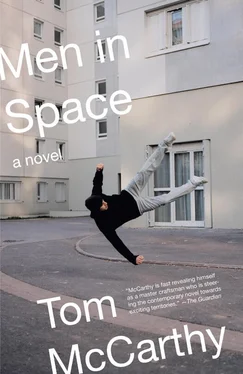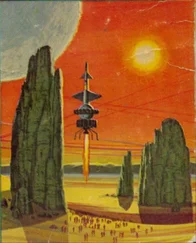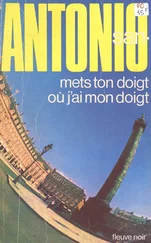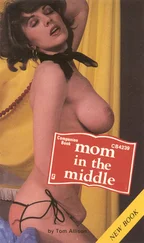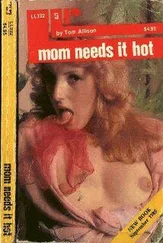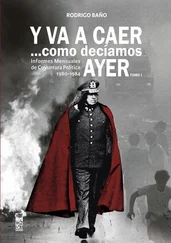I met Maňásek yesterday. Martin despises him and did everything he could to try to talk me out of looking at his work, but I invited him round all the same. He’s in his middling thirties but seems older, doubtless due to the degenerate life he leads. He stumbled into the gallery looking like an aristocratic tramp: bearded, his hair all dishevelled, but wearing a deep-blue blazer. Martin grudgingly introduced us. I noticed that he wasn’t carrying a portfolio, and commented on this. “Oh no,” he said, “if you would deign” (we were speaking English; I promise you he actually used this word , deign ) “to come to my atelier, I’m sure we can accommodate your desire to assess my work.” Accommodate . Those that do speak English here — or those of Maňásek’s generation that do — speak it very formally, their grammar perfectly correct but utterly awkward. I’d love to see the textbook they all used .
So we went round to his studio. Wandering there through a park, we bumped into two young ladies with whom Maňásek was apparently acquainted. Maňásek suggested they accompany us to his place, winking to me, evidently unaware of which side of the street I do my shopping on. He made us stop off to buy several bottles of vodka on the way — borrowing, in the most caddish fashion, money from the girls to do so .
He lives on the top floor of a glorious but decrepit apartment block. Pays peanuts for rent. That won’t last long. The point is, though, that his work was quite intriguing. He paints and makes collages by assembling objects that have the misfortune to cross his path, gluing these to canvases. He does this without any apparent programme, doctrine, logic of assembly or whatever you might call it in mind — yet they look rather good. There’s something fundamentally honest about them. He’ll find a tie lying on the floor, pick it up and paste it on so it half covers a photograph of a family picnic, then paint round a plastic toy that’s stuck to it, then reproduce the outline of the toy elsewhere, and so on. An innate aesthetic sense prevents the experiment from becoming a mere hotchpotch of marks and interventions. He assembled, glued and painted even as we talked — well, not at first: etiquette demanded that we immediately fall upon the vodka. We must have polished off the first bottle within ten minutes. When I admitted to feeling the effects, Maňásek proposed that I should snort some speed and, true to his word, lifted a cigar box from a mirror lying on his coffee table to reveal a line of white flakes marshalled into formation by a razor blade that now was resting, sergeant-major-like, in front of them. I vigorously declined his offer, and expressed a preference for coffee .
So he disappeared into his kitchen to make some, dragging giggler number one with him and leaving me alone with giggler number two. Did she speak English? I enquired . Ne , she demurred. German? French? Spanish? Ne, ne, ne: Český . Right. There’s only so much polite smiling one can do — especially when one’s already feeling nauseous from drink. After five minutes I could hear the water boiling. After ten minutes it was still boiling. No other sound was coming from the kitchen. I went through to find out what the delay was — and found giggler number one leaning back against the cooker, quite oblivious to the state of the water, while Maňásek knelt before her with his head shoved up her skirt. Seeing me, she shrieked and pushed him away, but Maňásek, ejected from his tent, just grinned up at me and declared: “An aperitif!”
We drank the coffee — accompanied by more vodka of course (“to facilitate its peregrination through our bodies”) — and, between sticking more objects to his canvas, he showed me his other paintings. Very good. I told him so. He wanted me to come with him to a party that a French painter was throwing, but I was already feeling so drunk I had to decline. He asked me if I liked the girl he’d left me with and I spilt the beans, told him she was delightful but entirely the wrong gender — at which point he all but insisted on taking me up to some hillside cruising spot he knew about. You’ll be reassured to learn that I scotched this plan, singing instead the praises of a brilliant Amsterdam printmaker and commercial artist, perfectly equipped, I assured him, to satisfy my every desire. I only hope you’re showing the same fidelity in my absence, surrounded as you are by all these pouting Adonises you keep hiring as assistants. I told him I’d be delighted to include him in the Stedelijk Bureau exhibition, made an appointment to visit to discuss terms several days hence and left. I managed to refrain from vomiting until I made it back to Martin’s. Poor bastard: first I vomit on his artists, then his floor .
I’ll be here until Christmas. Tallinn in the first week of next year. Then Cracow, Warsaw. Contact addresses as and when, but Martin’s is a safe bet for the time being. Have the catalogues for the Jim Harris exhibition gone to press yet? Deadline soon. Oh, and could you, would you pay my phone bill? I’ll recompense you in kind, or at least kindness …
Thinking of you ,
Joost xxx
* * * * *
Early evening. Outside, the sky’s gone dark-blue above the rows of chimney pots and television aerials. The rattle and whine of passing trams carries to the kitchen with more intimacy than it does during the daytime, as though darkness had removed walls separating rooms, apartments, buildings and the street, run all these into one new, large, unbroken space enclosed within a dome whose ceiling is ten or fifteen metres above the rooftops …
Helena’s making meatballs. She’s at the messy mixing stage. Fingers, not fork: it gives it more consistency. Besides, she likes to feel the general mêlée happening: the knotting one into the other of egg, mince, onion, herbs, breadcrumbs and pine nuts. The pliancy of flesh. The mixture’s still a little too dry: she dips her right hand into the bag of flour and rubs her thumb against her fingers to roll off some of the gunk, then picks another egg up, cracks it on the bowl’s edge, gently pours the yolk back and forth between the two shell-cups till it’s separated from the white, then lets it drop and break on the pink-and-white mountain, ooze across its ridges and valleys. She scoops another handful of pine nuts out of their jar and airdrops them in too …
The recipe’s her father’s: her Greek, Leninist father’s. She’s accepted lamb’s unavailability and uses beef — but to leave out the pine nuts would be sacrilegious: an insult to the Greece she’s never seen. If he managed to procure them in first Moscow, then Sofia, she can find and pay for them in Prague — and not skimp on the quantity, at that. When he oversaw her cooking meatballs as a child he always used to intone Add more … add more … add more … sitting on his stool beside the cooker, right leg permanently stiff from Metaxa’s shrapnel, smiling reassuringly as though to say money’s nothing: these flavours are what matter most in life . As she grew older and he grew more demoralized after the fall from Party favour brought on by his uncompromising idealism (though Helena’s Russian mother had another word for it, and screamed it at him nightly: Upryamstvo! Obstinacy! Stupid, naive obstinacy! You want your daughter to grow up an orphan for the sake of an ideal? ), after the show trial and humiliating pardon for a crime he’d not committed, the refused applications to emigrate West and the eventual relocation, begrudged by him as much as by the O.V.I.R., to the backwater of Bulgaria … during his last years, Helena came to see that smile as embittered and nostalgic. A packaged taste, dried and transported across a continent — this is all I have left …
Читать дальше
